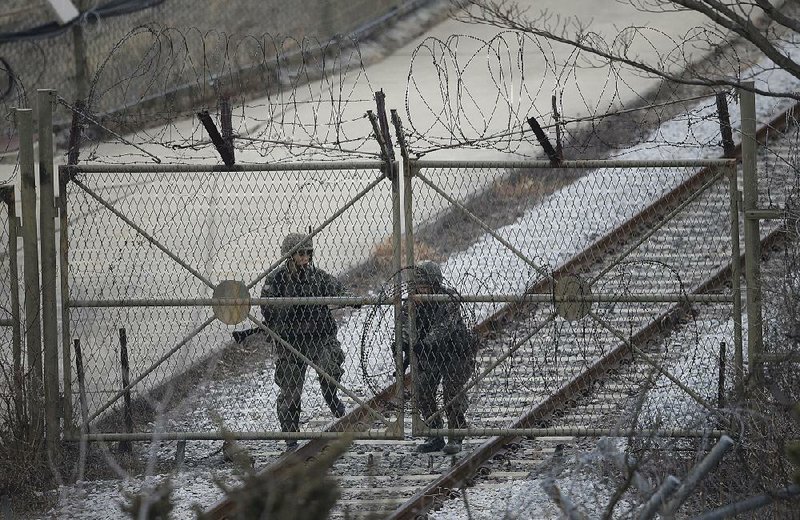The United States has opened the door to parking a ballistic missile defense system on North Korea's doorstep after Sunday's launch of a long-range rocket prompted South Korea to again say it will consider allowing the deployment on its soil of a U.S. army system known as THAAD.
For years, South Korea has danced around the idea of THAAD, which targets missiles at high altitudes and could complement lower-altitude defenses already in the country. But after North Korea's nuclear test on Jan. 6, the South's president, Park Geun-hye, said she would consider accepting THAAD to better cope with the North's growing nuclear and missile threats.
Such a move risks annoying neighbor China, which has warned against the THAAD system being deployed on the Korean peninsula.
President Barack Obama is trying to work all sides. He spoke with Chinese President Xi Jinping a few days before the launch "about the need to really tighten the noose" on North Korea, agreeing to a verifiable denuclearization of the Korean peninsula, Obama said in an interview with CBS that aired Monday.
"But what we're also doing is consulting with the South Koreans for the first time about more missile defense capabilities to prevent any possibility that North Korea could reach U.S. facilities or U.S. populations," Obama said.
While THAAD, which is short for Terminal High Altitude Area Defense, could be a deterrent, it would also raise the stakes for security in a region where suspicions already run high over Japan's military aggression during World War II and a later conflict that split the Korean peninsula between an isolated, unpredictable regime in the north and what is now a democracy in the south.
"The Chinese are doing anything possible to head off what they think might be a potential weapon that could be used against them," said Richard Bitzinger, a senior fellow at the S. Rajaratnam School of International Studies in Singapore. "You can say everything you want, that this is not directed against the Chinese, but the fact of the matter is, it potentially could be."
South Korea has long assured China, its biggest trading partner, that it was not in talks with the United States about the deployment of THAAD. North Korea's recent actions have changed that, with defense officials saying in Seoul they can not afford to ignore calls for a stronger shield against weapons of mass destruction.
"It would draw ridicule for a sovereign nation like South Korea not to beef up its defense in the face of an increasing threat like North Korean nuclear missiles," said Park Chang-kwon, a senior research fellow at the state-run Korea Institute for Defense Analyses in Seoul. "THAAD helps deter North Korea from seeking nuclear arms because it sends a strong message South Korea is and will keep responding with tough actions."
South Korea opening to THAAD may increase calls in Japan to follow suit.
In November, Defense Minister Gen Nakatani said that Japan was considering the deployment of THAAD to counter any potential strike from North Korea, although Chief Cabinet Secretary Yoshihide Suga said Monday that the country had no plan at the moment to introduce the system. Japan and South Korea already both have Patriot missiles, and the countries, alongside China and India, are among the biggest spenders on defense in Asia.
"From North Korea's perspective, THAAD is a big problem because it reduces the probability of a successful attack," said Jack Midgley, defense industry consultant with Deloitte Tohmatsu Consulting in Tokyo. "For a DPRK [Democratic People's Republic of Korea] planner, this means that to have an assured successful attack, he needs to fire a lot of missiles -- not just one or two. And the DPRK doesn't have that capability. So THAAD reduces the value of nuclear threats by DPRK."
The system would only be deployed on U.S. bases in South Korea -- there are nearly 29,000 U.S. soldiers stationed there -- and talks on the terms for that have no clear timetable. The discussions could face resistance from a South Korean public wary of hurting ties with China.
But it would also send a message to Beijing that it should do more to rein in North Korea by using its influence. China supplies most of North Korea's energy and food imports, and the U.S. called on Beijing to curb that trade.
Secretary of State John Kerry failed last month during a visit to Beijing to secure China's support for tougher sanctions, with the countries agreeing only to pursue a new United Nations Security Council resolution. The U.S. has sought measures such as bans on oil exports to Pyongyang.
While South Korea has sought to deepen ties with China since Park took office in 2013, it has been frustrated by China's failure to stop Kim from testing nuclear devices. China warned last year that the use of THAAD would risk undermining ties, saying the Park government should reject the system in the interest of peace and stability of the whole region.
A Section on 02/09/2016

